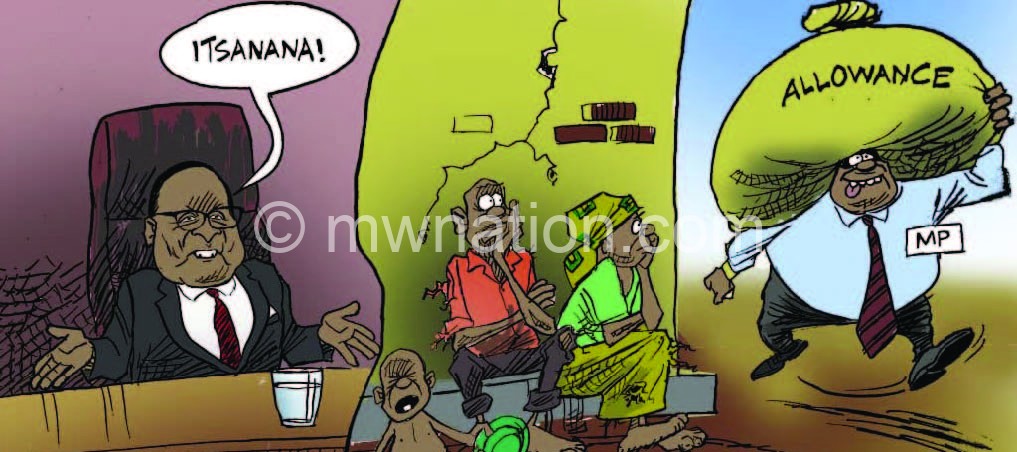MPs fatten own wallets
- Double monthly allowance to K2.2m
- Windfall amid poverty, shrinking revenue
Members of Parliament (MPs) have given themselves an early Christmas gift with a sharp increase in their salaries and allowances that has seen their annual wage bill rising from K15.4 billion to K20.7 billion.
The breakdown shows that salaries for Parliament have jumped from K2.4 billion in the 2019/20 budget to K3.4 billion in the 2020/21 budget while allowances have moved from K2.2 billion in 2019/20 budget to K5.01 billion.

Documents we have seen show that only the two items—salaries and ‘other allowances’—have increased in the National Assembly rest have been reduced or witnessed marginal increases.
Based on the budget document we have seen for Vote 080, which is the National Assembly, on Programme 35: Legislative and Oversight, internal travel has slightly moved from K4.35 billion to K4.39 billion while external travel was cut from K922 million to K744 million.
One MP confided in The Nation that each legislator is now getting an extra K1.1 million in allowances per month.
Said the legislator: “The October salary was paid with arrears on allowances dating back to July and that was over K4.5 million because the increment in allowances was increased by over K1.1 million.
“This explains why we [MPs] did not give problems in passing the budget. But I don’t think with the current economic situation, any government would be taking this route of increasing MPs’ allowances.
“The figures were discussed at Parliamentary Service Commission and everybody agreed. Actually, MPs wanted more on allowances. You should ask yourself why allowances have shot that much when the rest of the items have seen marginal increases or decreases.”
Previously, according to a pay-slip of an MP we have seen, legislators got K862 400 in basic salary while allowances were put at K200 000 for housing, K400 000 as constituency allowance and K250 000 for motor vehicle maintenance.
They were also getting K150 000 as hospitality allowance and K150 000 for utility bills.
The allowances totalled K1 151 860 per month. However, with the K1.1 million, the allowances have now moved to over K2.2 million a month.
In terms of basic salary, a 10 percent increment has been effected, meaning the salary has now moved from K862 400 to K948 640.00
Another MP also corroborated the figures, but indicated that as of yesterday the legislators were yet to get their pay.
Ministry of Finance spokesperson Williams Banda said he could not comment on the matteras Parliament was better placed to speak.
“The inside of the budget fall under the realms of the institution itself, so you should talk to Parliament, the owner of the vote. It’s like your home budget, I can tell you that I am giving you K10 million, but what you do with it is up to you,” he said.
Since October 21 whenwe wrote Parliament for a response on why the budget shot that way, public relations officer Ian Mwenye demanded a questionnaire which is yet to be responded to.
Apart from stating that the matter was being discussed at Parliament to provide a definite response, Mwenye has in many instances not been responding to calls and WhatsApp message reminders.
The increases are coming at a time when the country is going through hard economic times, and the 2020/21 budget itself, has an overall fiscal balance deficit of K651.5 billion, which is 9.1 percent of gross domestic product (GDP).
Speaking when he presented his maiden national budget, Minister of Parliament Felix Mlusu said the deficit will be financed by foreign borrowing amounting to K161.5 billion and domestic borrowing amounting to K490.0 billion.
He said: “Madam Speaker, it is important to note that if this deficit
has to be reduced, further cuts in the budget would be required.
“However, such cuts are constrained by the mandatory nature of most budget lines such as; wages and salaries, public debt service,
pensions and gratuities, grants to subvented organisations, court claims and compensations.”
While stating that fiscal discipline cannot be applied to cutting people’s needs, economics professor Ben Kaluwa, who teaches at Chancellor College—a constituent college of the University of Malawi, wondered why allowances such as fuel would go up when the prices have gone down.
He said: “Again, the cost of accommodation, due to coronavirus has also somehow been reduced. So, these items cannot be used as justification for increasing allowances exorbitantly. Each one needs to feel the pinch, if there is any, not just the poor.”
Government figures indicate that on average, monthly tax revenue collections have dropped from K90.8 billion per month during pre-Covid-19 to a monthly average of K59.1 billion during the post-Covid-19 period, representing a 35.0 percent drop.
The President signs for such reviews of perks.





